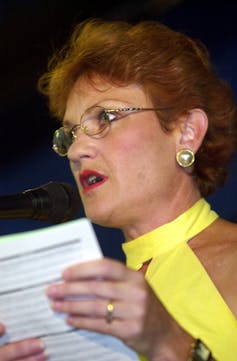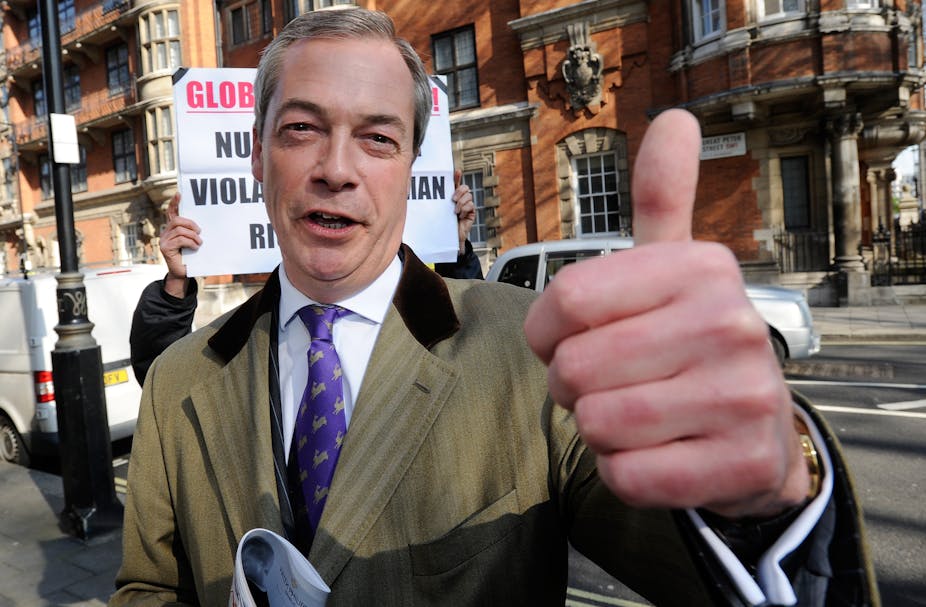UK Independence Party (UKIP) leader Nigel Farage now has a problem. In the wake of his party’s success in the recent European Parliament election, Farage and his UKIP colleagues need to determine how best to maintain their momentum. The logical progression is to consolidate this success at the next UK general election in May 2015.
However, UKIP forcing its way into Westminster will be neither easy nor necessarily a good idea.
The biggest loser in the recent European elections was arguably British prime minister David Cameron. Admittedly, Britain’s deputy prime minister and Liberal Democrats leader, Nick Clegg, fared worse, but his position has been increasingly untenable for some time.
Cameron, too, has a problem: how to respond to the threat on his right. Even before the elections, some of the more vocal Eurosceptics – comprising about one-third of the parliamentary Conservative Party – were calling for an electoral pact with Farage.
The concession of a referendum on British membership of the European Union if the Conservatives return to power was widely seen as a victory for the Eurosceptic wing of the Conservatives, itself driven by fear of a rise in support for UKIP.
We’ve seen something like this before in Australia, which may serve as an important source of inspiration for the political actors in Britain.
In Australia, a small, populist party with a charismatic leader made a significant impact on the shape of national politics in the 1990s. Pauline Hanson and her One Nation Party appeared to be an irresistible political force when they threatened to steal rural and regional voters from the Liberal-National Party Coalition government. Hanson herself was a disendorsed Liberal Party candidate.
Similar to the contemporary populist parties in Europe, One Nation was highly critical of the social and economic policies of successive governments. Of critical concern was the sense that “average” citizens had been marginalised in the political debate and that the established pattern of domination by the major parties was somehow “broken”.
At the core of One Nation’s appeal, however, was Hanson’s charisma and her focus on issues of race and immigration.
The electoral threat that One Nation posed to the right-of-centre Coalition was significant. In Queensland’s 1998 state election, 22.68% of voters gave their first preference to One Nation. The party won 11 seats in the state parliament.
The Coalition, seeing the very real threat One Nation posed to its electoral fortunes, was caught in a difficult bind and appeared unable to stop the party’s rising popularity within its own constituency. Then-prime minister John Howard avoided directly engaging with Hanson and was criticised for not immediately rebuking her policy agenda.
In an attempt to thwart the emerging threat, the Coalition followed Labor’s lead in placing One Nation last in the preference deals at the federal election held later in 1998. This meant the party could only win one Senate spot in Queensland and Hanson was unable to retain her lower house seat.
Despite its spectacular emergence, One Nation quickly imploded and vanished from the political scene. By the 2001 election, One Nation had become a marginal player in federal politics and by 2004 it was out of the Senate.
One Nation’s main problems seemed to come from a couple of areas. First, the party’s unusual organisational structures led to internal power struggles. This caused many members to leave the party, especially once they felt superfluous to its operations.

Second – and more applicable to UKIP – One Nation did not effectively make the transition from criticising the established political institutions as “outsiders” to becoming political “insiders” with parliamentary representation. The party appeared to be unable to effectively use its Senate representation to advance its agenda in parliament.
One Nation did have some impact on the Howard government’s policies. The government appeared to incorporate some elements of One Nation’s thinking, especially on immigration in 2001 when Howard famously declared that the Australian government would:
…decide who comes to this country and the circumstances in which they come.
The Howard government also abolished the Aboriginal and Torres Straight Islander Commission in 2005 and appeared to be far more wary of rural and regional policy concerns. Even after nearly two decades, commentators still attribute some federal government decisions to One Nation’s enduring political legacy.
For Cameron, gaining the electoral ground his party appears to have lost to UKIP may be made easier by the presence of Lynton Crosby as the Conservatives’ election director. Crosby, described as the “master of the dark political arts”, served as the Liberal Party’s campaign director for each of Howard’s four election victories.
It may just be that victory in the European elections is the best of all possible worlds for UKIP. It gives them the visibility, voice and opportunity to influence British politics without the strains that will be revealed by the transition from Strasbourg to Westminster.
Becoming an “insider” in Westminster may well be the undoing of UKIP. Perhaps Farage should consider calling Hanson before committing to storm Westminster’s gates.

